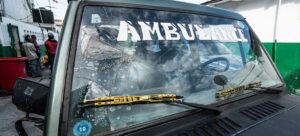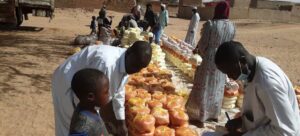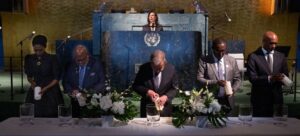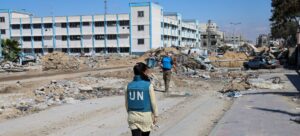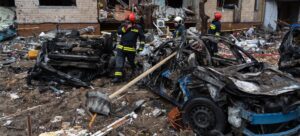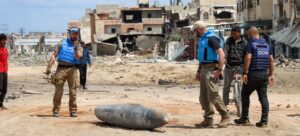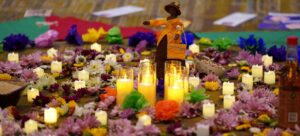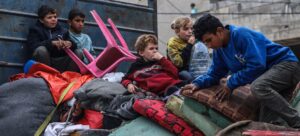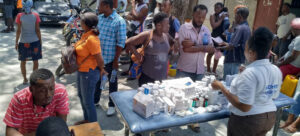Dennis Francis convened the UN’s most representative body, comprising all 193 Member States, following the Security Council’s failure to adopt a resolution put forward by the United States last month.
The debate was triggered by a 2022 Assembly resolution that calls for a meeting to be held within 10 working days whenever a veto is cast in the Council.
Death, destruction and division
“Once again, we convene under this initiative as conflict in Gaza rages into its sixth bloody month, as death and destruction rule the day, and as divisions among Member States, especially in the Council, persist,” Mr. Francis said.
During the Security Council meeting on 22 March, China and Russia vetoed a US draft resolution which stated the “imperative” for “an immediate and sustained ceasefire to protect civilians on all sides”, facilitating “essential” aid delivery and supporting ongoing talks between Israel and Hamas towards an end to the hostilities, tied to the release of hostages.
Russia, China and the US are permanent members of the 15-member Council, together with France and the United Kingdom, and they all have the right to veto any decision. Non-permanent member Algeria also voted against the resolution.
Three days later, the Council adopted a different resolution – which many had vowed to support – calling for a ceasefire for the remainder of Ramadan as well as the immediate and unconditional release of all hostages. Resolution 2728 was drafted by its 10 non-permanent members.
‘End the bloodshed’
Mr. Francis outlined the terrible toll in Gaza, which includes more than 32,500 Palestinians killed, 1.7 million displaced, and over 1.1 million facing a catastrophic level of food insecurity.
While welcoming resolution 2728, he lamented that “it comes after five painful months of division, bloodshed and unconscionable loss.”
Noting that Ramadan ends on Tuesday, he implored Security Council members to meaningfully use their power in support of an immediate and lasting ceasefire.
“I urge all those with leverage to do all in their power to end the bloodshed in Gaza now.” he said.
“Let us see the end of the waiting, including for the peaceful resolution of the Israeli-Palestinian conflict, in line with the two-State solution, as the only credible formula for lasting resolution.”
Dmitry A. Polyanskiy, First Deputy Permanent Representative of the Russian Federation, addresses the UN General Assembly plenary meeting on the use of the veto on the situation in the Middle East, including the Palestinian question.
Veto ‘the only correct way’: Russia
Russian Deputy Permanent Representative Dmitry Polyansky said his country and China vetoed the US draft resolution which “not only was not geared towards ending hostilities in Gaza, but which essentially gave Israel carte blanche to continue its inhumane operations which run counter to international humanitarian law”.
He pointed to the “historic responsibility” that permanent members of the Security Council have regarding the maintenance of international peace and security, saying “it is specifically for this that the veto mechanism exists in order to prevent the pushing through of nefarious and dangerous initiatives” in the chamber.
He said Russia’s decision to veto “was the only correct way” as it allowed for the adoption of the other resolution, “the heart of which was a direct demand for an immediate establishment of a ceasefire for the period of Ramadan, which is to result and lead to a lasting ceasefire.”
Ambassador and Deputy Permanent Representative Bing Dai of China, addresses the UN General Assembly plenary meeting on the use of the veto on the situation in the Middle East, including the Palestinian question.
Killing would continue: China
Ambassador Bing Dai of China said its decision to veto was based on the need to uphold international justice, the purposes and dignity of the UN Charter, and the responsibility and authority of the Security Council.
The grave concerns and strong dissatisfaction of Arab States with the draft resolution were also taken into account.
He noted that since the start of the war in October, the international community has been overwhelmingly calling for a ceasefire and an end to the fighting, demanding the Security Council take concrete action.
“However, the United States, as a country with significant influence over the parties concerned, has repeatedly obstructed the Council’s voice on the ceasefire and has vetoed four times against the Council’s efforts to promote an immediate ceasefire,” he said.
Furthermore, the US draft deviated from the consensus of Council members and ran counter to the expectations of the international community.
“If adopted, it will mean that the killings in Gaza will continue. It will mean that the vicious act of violating international law and international humanitarian law will continue,” he said. “China has no hesitation in exercising its veto against a draft resolution that will have such serious consequences.”
Riyad Mansour, Permanent Observer of the State of Palestine to the United Nations, addresses the UN General Assembly plenary meeting on the use of the veto on the situation in the Middle East, including the Palestinian question.
Fully implement resolutions: Palestine
The Permanent Observer of the State of Palestine, Riyad Mansour, noted that the General Assembly called for a cessation of hostilities 20 days after the start of the conflict on 7 October.
A month later, the Assembly demanded an immediate humanitarian ceasefire, stressing the need to protect civilians and stem what was already a dire humanitarian catastrophe. Meanwhile, the Security Council took nearly six months to do the same.
“Now these resolutions need to be fully respected and fully implemented so the genocide in Gaza can stop; so families on both sides can reunite in life, not death,” he said.
Highlighting the devastation, he said Israel has besieged, bombed, starved and displaced an entire civilian population.
“Impunity kills,” he said. “If Israel thought it would be held accountable, it would never have killed more than 33,000 Palestinians, maimed more than 75,000 and destroyed Gaza north to south.”
Mr. Mansour urged all countries that provide weapons and ammunition to Israel to stop doing so.
“Stop arming Israel. Stop trading with settlements. Hold accountable those responsible for the massacres, and not the colonization – not only individuals, but those responsible at the highest level, for these illegal and inhumane policies.”
Ambassador Gilad Erdan of Israel addresses the UN General Assembly plenary meeting on the use of the veto on the situation in the Middle East, including the Palestinian question.
No condemnation for Hamas: Israel
Annihilation of the Jews has been the goal of the Palestinians since well before the establishment of the UN or Israel, said the country’s Ambassador, Gilad Erdan.
While the UN was created in the wake of the Second World War to prevent atrocities such as the Holocaust, “the same genocidal ideology that this body was founded to combat is still prevalent among the Palestinians,” he added.
Mr. Erdan said the Hamas attacks on 7 October were the most heinous and widespread massacre of Jews since the Holocaust. Entire families were wiped out, peaceful communities reduced to ash, Israeli women raped, and over 250 hostages seized and taken to Gaza.
Yet, the General Assembly was meeting not to condemn Hamas or their atrocities, but because certain Security Council members “refused to even accept a condemnation to child murdering rapists and they vetoed it,” he said.
“Six months have passed since the massacre and not a single UN body…has even condemned Hamas, and not even one meeting has been dedicated to our hostages. It’s insane,” he remarked.
Deputy Permanent Representative Robert A. Wood of the United States addresses the UN General Assembly plenary meeting on the use of the veto on the situation in the Middle East, including the Palestinian question.
USA rejects ‘petty politics’
Ambassador Robert Wood said the draft US resolution was put forward in good faith and the vast majority of Council members voted in favour of it.
“Russia and China offered many over-the-top explanations for their obstruction,” he said. “Rather than support diplomacy to release the hostages and secure a ceasefire, they attacked the United States.”
Russia and China are not engaged in meaningful diplomacy and only offer lectures, but “worse, they continue to shield Hamas”, he continued. Furthermore, the claim that the US did not want a ceasefire was untrue.
“There is no doubt: the United States supports a ceasefire. And we know that the way to achieve that is through negotiations to reach an agreement in which hostages are released,” he said, adding that talks are ongoing, brokered by Egypt and Qatar.
The US draft resolution also called for other critical items, he added. They included strengthening the mandate of the Senior UN Humanitarian Coordinator for Gaza, Sigrid Kaag; opening additional crossings for aid, and immediate measures to fix deconfliction processes as the war has been among the worst in terms of aid workers killed.
“The United States rejects Russia and China’s decision to play petty politics,” he said. “We will continue efforts to advance peace in the region.”
He said efforts include remaining at the negotiating table to enable the release of hostages and a ceasefire, providing massive support for humanitarian operations, and continuing to press Israel to take specific steps to address civilian harm, humanitarian suffering and the safety of aid workers.
